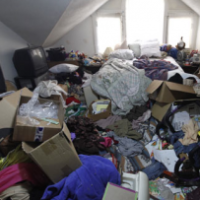Hoarding is becoming a very serious issue, not just in Thunder Bay, and not constrained to any specific demographic, neighbourhood, or socioeconomic class. Hoarding can be found, and is found, across a broad range of all of the above.
Hoarding hurts not only the hoarder themselves, but also the people and pets around them, the buildings in which they live, and the communities in which they reside. From bacteria, mould, and infections, parasites, insects and rodents, to towering piles of clutter and garbage, structural damage and blocked exits, hoarding conditions lend themselves to one very dangerous situation.
From a safety perspective, perhaps the largest issue that hoarding homes can present, is that of a fire hazard. A hoarding home will most certainly have a very large ‘fire load’ and in most instances, will ignite very quickly and burn very intensely. Often clutter is stacked against doorways and windows, limiting entrance and egress to and from the home. These conditions present a huge risk and challenge to First Responders that may be attempting to help the homeowner and occupants in the case of an emergency. The risk in these cases is also very real to other occupants in the case of apartment buildings, duplexes, semi detached homes and so on.
What can you do, if you suspect that a Neighbour is a hoarder? Or, if a family member or friend is living in Hoarding Conditions? The answer is not easy as there are always so many factors involved in these types of scenarios.
Help them to reduce the clutter, if the person is receptive to having help. Create a neighbourhood task force, to help remove excess clutter from the yard. Help them to ensure that doorways are clear and that doors can fully open. There should be clear pathways throughout the home, and at least 2 points of egress from every room. Limit the use of extension cords, which present a shorting hazard as well as a tripping hazard. And PLEASE, do NOT allow them to hoard living creatures and pets.
While the above types of support can be a great starting point, sometimes living conditions have demised to the point that further intervention is necessary. At this point, definitely engage your local Public Health Department, Fire Department, or Landlord, who will know how to act in the best interest of both personal and public safety.


No comments yet.